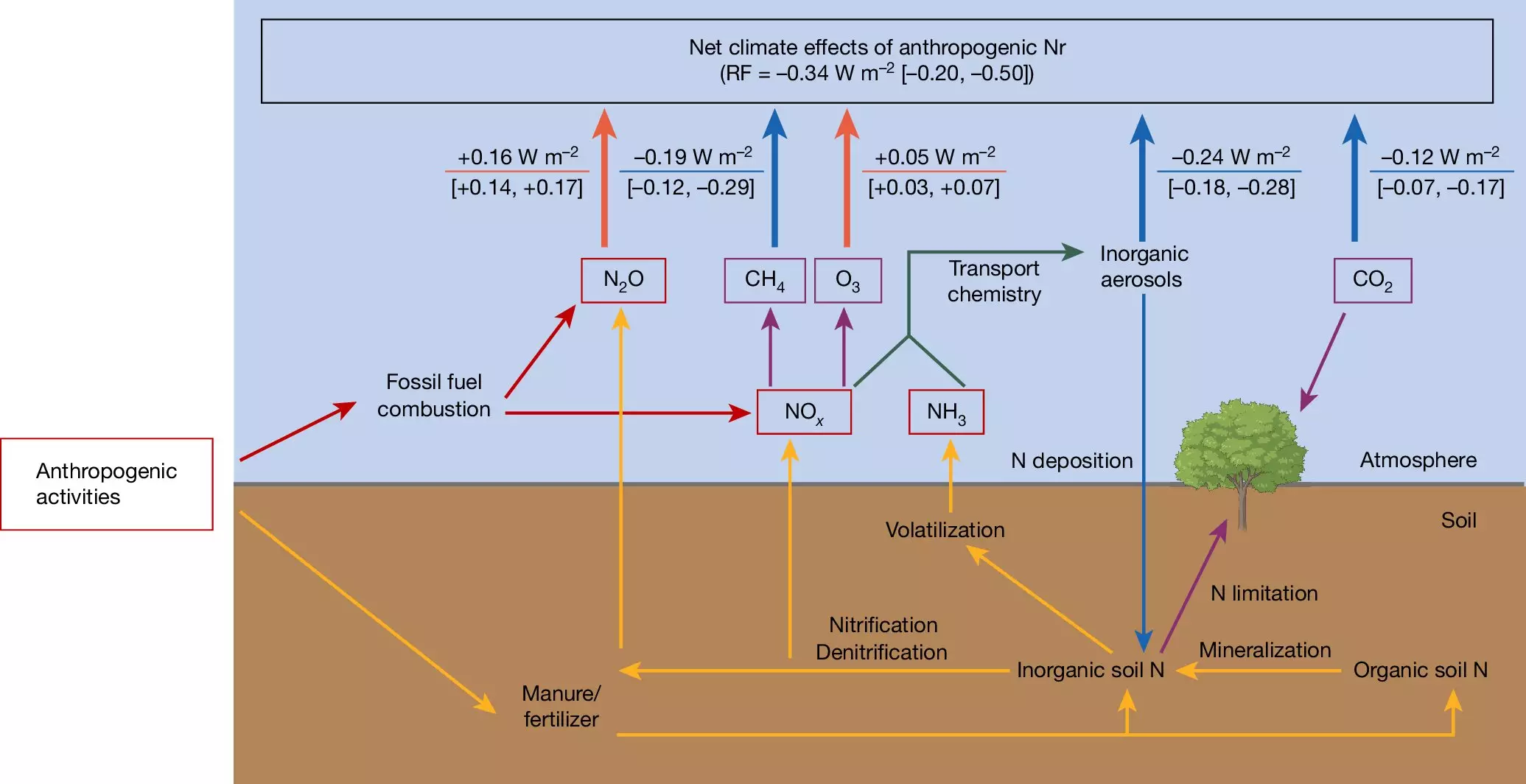Nitrogen compounds are a double-edged sword in the environmental narrative, presenting both opportunities for climate cooling and serious risks for ecological and human health. While it is clear that nitrogen fertilizers and nitrogen oxides derived from fossil fuel combustion have damaging effects—polluting our air and water, contributing to biodiversity loss, and harming the ozone layer—recent research suggests a more nuanced role for these compounds in climate dynamics. This intricate relationship, brought to light by a comprehensive study from the Max Planck Institute for Biogeochemistry, reveals that human-induced nitrogen has a net cooling influence on the planet. Such findings complicate our understanding of nitrogen’s role in climate change and raise pressing questions about how we manage it.
The Cooling Effect of Nitrogen Compounds
Nitrogen exists in various forms, each significantly influencing the climate in distinct ways. The study underscores that while elemental nitrogen is inert and climate-neutral, reactive nitrogen—comprising compounds like nitrous oxide and nitrogen oxides—can either warm or cool the planet depending on their interactions with atmospheric processes. Researchers found that nitrous oxide, a potent greenhouse gas produced from both agricultural practices and fossil fuel combustion, is 298 times more effective than carbon dioxide at trapping heat in the atmosphere. Conversely, short-lived nitrogen oxides, primarily emitted during fossil fuel combustion, have a somewhat paradoxical role: they contribute to the formation of fine particles that reflect sunlight, thus having a cooling effect. Furthermore, ammonia emissions from agricultural practices can stimulate plant growth, leading to increased carbon absorption from the atmosphere. This complex role of nitrogen challenges the prevailing notion that all nitrogen applications are detrimental to the climate.
Finding Balance in the Nitrogen Cycle
Understanding the global nitrogen cycle is crucial for grasping its effects on climate. The research indicates that the overall impact of human nitrogen contributions cools the climate by approximately -0.34 watts per square meter. In stark contrast, human-induced greenhouse gases heat the atmosphere by an average of 2.7 watts per square meter. Although this suggests a slight cooling effect from nitrogen, it is vital to comprehend that the interplay of nitrogen and climate is highly complex. This complexity is underlined by the fact that not all effects are uniform across the globe; they can vary significantly by region and rely on multiple feedback mechanisms within Earth’s climate system.
Cautionary Tales of Nitrogen Fertilization
While these findings could be perceived as good news in the battle against global warming, they come with caveats. The study’s co-author, Sönke Zaehle, cautions against interpreting the data as a green light for nitrogen fertilization as a climate mitigation strategy. Nitrogen emissions have widespread negative impacts that extend beyond climate, including harming human health and degrading biodiversity. Excessive nitrogen runoff can lead to nutrient pollution in water bodies, resulting in harmful algal blooms that devastate aquatic ecosystems. Hence, while nitrogen may contribute to some cooling effects, its adverse effects on health and biodiversity cannot be overlooked.
A Call for Sustainable Practices
The researchers emphasize the necessity of adopting improved agricultural practices that optimize nitrogen use while minimizing its harmful emissions. By doing so, not only can we mitigate nitrous oxide emissions that exacerbate global warming, but we can also protect human health and ecosystems. Innovative farming strategies, such as precision agriculture, can allow for a more targeted application of fertilizers, enhancing nitrogen efficiency while lessening environmental impacts. This calls for a shift in the agricultural paradigm—one that balances the need for food production with the urgent requirements of sustainability and ecological stewardship.
The Road Ahead: Reducing Anthropogenic Nitrogen
To navigate the seemingly paradoxical nature of nitrogen in climate dynamics effectively, a coordinated approach is vital. Reducing reactive nitrogen inputs should go hand-in-hand with a broader agenda that also targets carbon dioxide and methane emissions from fossil fuel combustion. A multi-faceted strategy that addresses the interconnections among nitrogen management, greenhouse gas emissions, and ecosystem health will be crucial for ensuring a more sustainable future. The challenge lies not just in mitigating climate change but in fostering a holistic understanding of how various elements, including nitrogen, interact within our fragile planetary systems. Addressing these challenges will require collaboration among scientists, policymakers, and farmers to create a balanced and sustainable approach to nitrogen management, one that acknowledges its complex role in environmental health and climate stability.

